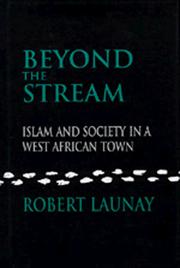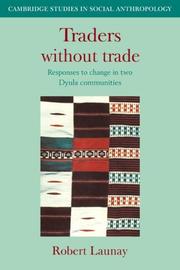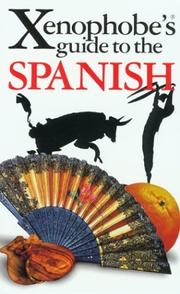| Listing 1 - 10 of 49 | << page >> |
Sort by
|

ISBN: 0520077180 0585123640 Year: 1992 Volume: 15 Publisher: Berkeley (Calif.) : University of California press,
Abstract | Keywords | Export | Availability | Bookmark
 Loading...
Loading...Choose an application
- Reference Manager
- EndNote
- RefWorks (Direct export to RefWorks)
Dyula (African people) --- Islam --- Muslims --- Dioula (Peuple d'Afrique) --- Musulmans --- Religion --- Customs and practices --- Religious life --- Coutumes et pratiques --- Vie religieuse --- History & Archaeology --- Regions & Countries - Africa --- Religion. --- Customs and practices. --- Islamic religious practice --- Sharia (Islamic religious practice) --- Dabakala (African people) --- Dioula (African people) --- Diula (African people) --- Djula (African people) --- Dyoula (African people) --- Dyoura (African people) --- Dyulake (African people) --- Dyulanke (African people) --- Jula (African people) --- Juula (African people) --- Wangara (African people) --- Wankara (African people) --- Mohammedans --- Moors (People) --- Moslems --- Muhammadans --- Musalmans --- Mussalmans --- Mussulmans --- Mussulmen --- Ethnology --- Religious adherents --- Côte d'Ivoire --- Religious life and customs.
Book
ISBN: 9780253022707 0253022703 9780253023025 0253023025 0253023181 9780253023186 Year: 2016 Publisher: Bloomington ; Indianapolis : Indiana University Press,
Abstract | Keywords | Export | Availability | Bookmark
 Loading...
Loading...Choose an application
- Reference Manager
- EndNote
- RefWorks (Direct export to RefWorks)
Writing boards and blackboards are emblematic of two radically different styles of education in Islam. The essays in this lively volume address various aspects of the expanding and evolving range of educational choices available to Muslims in sub-Saharan Africa. Contributors from the United States, Europe, and Africa evaluate classical Islamic education in Africa from colonial times to the present, including changes in pedagogical methods'from sitting to standing, from individual to collective learning, from recitation to analysis. Also discussed are the differences between British, French, Belgian, and Portuguese education in Africa and between mission schools and Qur'anic schools; changes to the classical Islamic curriculum; the changing intent of Islamic education; the modernization of pedagogical styles and tools; hybrid forms of religious and secular education; the inclusion of women in Qur'anic schools; and the changing notion of what it means to be an educated person in Africa. A new view of the role of Islamic education, especially its politics and controversies in today's age of terrorism, emerges from this broadly comparative volume.
Islamic religious education --- Islamic education --- Muslims --- Education --- #SBIB:39A10 --- #SBIB:39A73 --- #SBIB:316.331H421 --- #SBIB:316.331H532 --- Mohammedans --- Moors (People) --- Moslems --- Muhammadans --- Musalmans --- Mussalmans --- Mussulmans --- Mussulmen --- Religious adherents --- Islam --- Education, Islamic --- Education, Muslim --- Muslim education --- Muslim religious education --- Religious education, Islamic --- Religious education --- History. --- Antropologie: religie, riten, magie, hekserij --- Etnografie: Afrika --- Morfologie van de godsdiensten: Islam --- Religieuze opvoeding, cathechese --- Africa, Sub-Saharan --- Africa, Black --- Africa, Subsaharan --- Africa, Tropical --- Africa South of the Sahara --- Black Africa --- Sub-Sahara Africa --- Sub-Saharan Africa --- Subsahara Africa --- Subsaharan Africa --- Tropical Africa --- Colonial influence. --- History --- Education&delete&
Book
ISBN: 9781405187763 9781405187756 140518776X 1405187751 Year: 2010 Publisher: Chichester ; Malden : Wiley-Blackwell,
Abstract | Keywords | Export | Availability | Bookmark
 Loading...
Loading...Choose an application
- Reference Manager
- EndNote
- RefWorks (Direct export to RefWorks)
Launay presents a selection of key texts that reflect the broad range of thought on human behaviour, from Herodotus and Ibn Battuta to Adam Smith and Adam Ferguson. He reveals how the concerns of anthroplogy were first formulated and explores the origins of different social and political systems.
Anthropology --- History. --- Philosophy. --- #SBIB:39A3 --- History --- Philosophy --- Antropologie: geschiedenis, theorie, wetenschap (incl. grondleggers van de antropologie als wetenschap) --- Anthropologie --- Histoire --- Philosophie

ISBN: 0521241790 0521040310 0511558058 Year: 1982 Publisher: Cambridge : Cambridge University Press,
Abstract | Keywords | Export | Availability | Bookmark
 Loading...
Loading...Choose an application
- Reference Manager
- EndNote
- RefWorks (Direct export to RefWorks)
The word dyula means 'trader' in the Manding language. It is also the name of certain Manding-speaking ethnic minorities in parts of northern Ivory Coast, who, for centuries before the advent of colonial rule, enjoyed a virtual trading monopoly over the local region. In the first part of this book Robert Launay describes two Dyula communities prior to the twentieth-century colonial period: he discusses the regional symbiosis between Dyula traders and Senufo farmers; the organization of Dyula activity; and the division of the communities into relatively small clan wards with high rates of in-marriage. The second part examines the ways in which both communities have adapted to the recent loss of their trading monopoly, and the strategies they have employed, such as emigration, the assimilation of Western education and the adoption of new occupations, to carve out a new economic niche for themselves. As an account of the incorporation of 'traditional' community into a modern town, the book will be of interest to anthropologists and others concerned with development and modernisation in Africa and the Third World.
Acculturation --- Dyula (African people) --- #SBIB:39A11 --- #SBIB:39A73 --- 338 <09> --- Dabakala (African people) --- Dioula (African people) --- Diula (African people) --- Djula (African people) --- Dyoula (African people) --- Dyoura (African people) --- Dyulake (African people) --- Dyulanke (African people) --- Jula (African people) --- Juula (African people) --- Wangara (African people) --- Wankara (African people) --- Ethnology --- 338 <09> Economische geschiedenis --- Economische geschiedenis --- Culture contact --- Development education --- Civilization --- Culture --- Assimilation (Sociology) --- Cultural fusion --- Antropologie : socio-politieke structuren en relaties --- Etnografie: Afrika --- Culture contact (Acculturation) --- Social Sciences --- Anthropology
Book
Publisher: Berlin : Adolphe Fürstner,
Abstract | Keywords | Export | Availability | Bookmark
Book
Year: 1973 Publisher: Genève : Minkoff,
Abstract | Keywords | Export | Availability | Bookmark
Digital
ISBN: 9781461406976 Year: 2012 Publisher: New York, NY Springer New York
Abstract | Keywords | Export | Availability | Bookmark
 Loading...
Loading...Choose an application
- Reference Manager
- EndNote
- RefWorks (Direct export to RefWorks)
Sociology of cultural policy --- Astrophysics --- Astronomy --- History of physics --- cultureel erfgoed --- astrofysica --- fysica --- astronomie
Book
Year: 1895 Publisher: Paris : Téqui,
Abstract | Keywords | Export | Availability | Bookmark
 Loading...
Loading...Choose an application
- Reference Manager
- EndNote
- RefWorks (Direct export to RefWorks)
Book
ISBN: 9780226575254 022657525X 9780226575391 022657539X Year: 2018 Publisher: Chicago (Ill.) London The University of Chicago Press
Abstract | Keywords | Export | Availability | Bookmark
 Loading...
Loading...Choose an application
- Reference Manager
- EndNote
- RefWorks (Direct export to RefWorks)
From the sixteenth to the eighteenth centuries, Europeans struggled to understand their identity in the same way we do as individuals: by comparing themselves to others. In Savages, Romans, and Despots, Robert Launay takes us on a fascinating tour of early modern and modern history in an attempt to untangle how various depictions of “foreign” cultures and civilizations saturated debates about religion, morality, politics, and art. Beginning with Mandeville and Montaigne, and working through Montesquieu, Diderot, Gibbon, Herder, and others, Launay traces how Europeans both admired and disdained unfamiliar societies in their attempts to work through the inner conflicts of their own social worlds. Some of these writers drew caricatures of “savages,” “Oriental despots,” and “ancient” Greeks and Romans. Others earnestly attempted to understand them. But, throughout this history, comparative thinking opened a space for critical reflection. At its worst, such space could give rise to a sense of European superiority. At its best, however, it could prompt awareness of the value of other ways of being in the world. Launay’s masterful survey of some of the Western tradition’s finest minds offers a keen exploration of the very notion of “civilization,” as well as an engaging portrait of the promises and perils of crosscultural comparison.
Other (Philosophy) --- Other minds (Theory of knowledge) --- Anthropology --- Philosophy

ISBN: 1902825438 Year: 2005 Publisher: London Oval books
Abstract | Keywords | Export | Availability | Bookmark
 Loading...
Loading...Choose an application
- Reference Manager
- EndNote
- RefWorks (Direct export to RefWorks)
| Listing 1 - 10 of 49 | << page >> |
Sort by
|

 Search
Search Feedback
Feedback About UniCat
About UniCat  Help
Help News
News